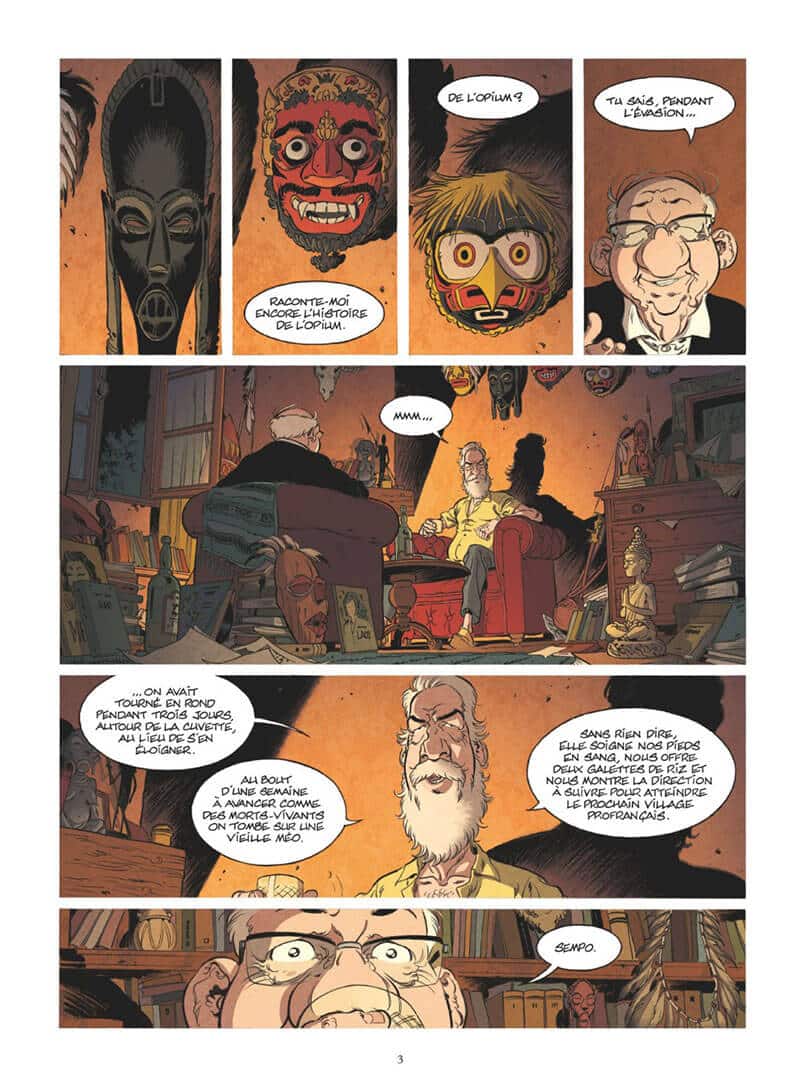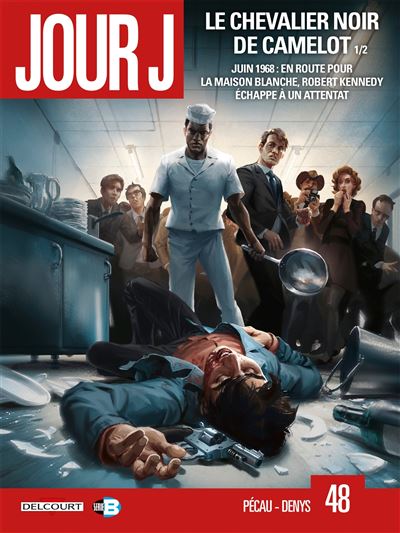In line with the Vieux fourneaux, Eacersall and Vallée offer us a regional adventure in Antananarivo at Glénat. But while the trio of Old Furnaces were real revolutionaries, Antananarivo offers a more complex situation…
A thwarted friendship
During the successive periods of confinement, you may have dreamed of travelling? This is also the case of a retired notary who regularly comes to listen to a great adventurer who has traveled the world. Joseph, this veteran of the Foreign Legion has signed up to follow Pinpin hero of the comics of his childhood. The reader necessarily thinks of Tintin but shhh! The trial must be avoided. By a glance at his library, we discover that he is a fan of exploration literature such as Conrad and Kessel among others. All these readings bring him a strength that we feel in his stories. Drinking these words, the ex-notary leaves his suburban pavilion and his conventional wife with his thoughts to travel to tropical countries. The cartoonist Sylvain Vallée renders this very well in Antananarivo. We take advantage of these silent pages to admire his style oscillating between the Franco-Belgian classic like the faces with big noses and the more modern realism of all the sets. The colorization of DELF is splendid.  The first pages of Antananarivo show that the notary and his neighbor form a very different duo. Physically, one is tall thin and bearded while the other is small and round. Their past and present lives are also radically different. One is free and lives naked in nature (from his garden) while the other is force-fed medicine by a clingy wife. Yet it is the adventurer's heart that lets go first. This death reveals a completely different reality…
The first pages of Antananarivo show that the notary and his neighbor form a very different duo. Physically, one is tall thin and bearded while the other is small and round. Their past and present lives are also radically different. One is free and lives naked in nature (from his garden) while the other is force-fed medicine by a clingy wife. Yet it is the adventurer's heart that lets go first. This death reveals a completely different reality…
Finding the heir
Once his neighbor is gone, the survivor is inconsolable and depressed. He regularly visits her grave to pay homage to her and chats with her ghost – but only in thought. Discreet and keen on his retirement, he refused to interfere in the succession. However, he is driven by the eagerness of the mayor of this suburban city who is eager to recover the house. It is during the first steps that the notary discovers that all these adventures are invented. They come from Pinpin's comics. Feeling betrayed, the notary wants to know the truth about this neighbor he has admired for fifteen years. He settles his scores by talking to his ghost who, each time, finds an excuse to preserve his status as a colonial adventurer.  In Antananarivo, the investigation into the genealogy of a liar is an opportunity to cross many archives and discover the absurdity of the administration. The civil registry office cannot give the address of an inhabitant, but the electoral rolls, managed by the same person, can. The reader discovers the work of notaries during successions. Genealogy becomes a police and even identity investigation. This investigation will allow the notary to discover the truth about his neighbor as well as the reader to discover that this retired calm has a more complex past than expected. Screenwriter Mark Eacersall avoids any idealization of colonization. If this period is a distant mirage for the two elders, the reality is harder. Antananarivo demonstrates the power of the imagination that allows you to dream your life and reconcile beings. Designer of Once Upon a Time France, Sylvain Vallée once again demonstrates his great talent. Mark Eacersall writes a story about identity and the secret that everyone carries within. He ends this quest with a touching ending but also hard for all. You can find chronicles of life by the articles in I saw the saucers and George Sand.
In Antananarivo, the investigation into the genealogy of a liar is an opportunity to cross many archives and discover the absurdity of the administration. The civil registry office cannot give the address of an inhabitant, but the electoral rolls, managed by the same person, can. The reader discovers the work of notaries during successions. Genealogy becomes a police and even identity investigation. This investigation will allow the notary to discover the truth about his neighbor as well as the reader to discover that this retired calm has a more complex past than expected. Screenwriter Mark Eacersall avoids any idealization of colonization. If this period is a distant mirage for the two elders, the reality is harder. Antananarivo demonstrates the power of the imagination that allows you to dream your life and reconcile beings. Designer of Once Upon a Time France, Sylvain Vallée once again demonstrates his great talent. Mark Eacersall writes a story about identity and the secret that everyone carries within. He ends this quest with a touching ending but also hard for all. You can find chronicles of life by the articles in I saw the saucers and George Sand.








































